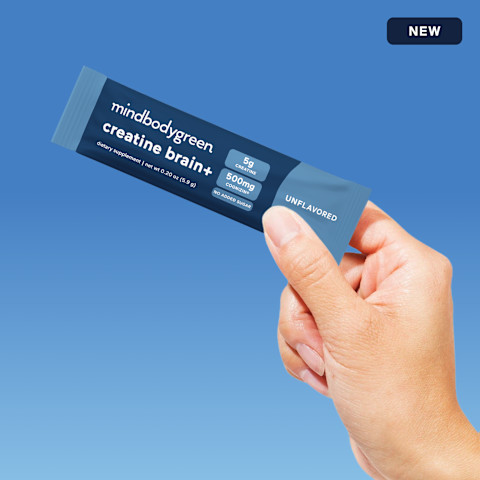Your Brain Starts To Shrink At Age 30 — Here's What To Do About It

If you want to work on your focus, mood, or memory, you should follow brain-healthy habits, like consuming brain-supporting nutrients, getting enough sleep, and so on. But, alas, your brain still ages regardless—no matter how many cognitive training exercises you may practice.
As neurophysiologist Louisa Nicola, founder of Neuro Athletics, explains on an episode of the mindbodygreen podcast, brain aging is unavoidable. What's more, your brain actually shrinks as you age, and it starts as early as 30.
However, that doesn't mean you can't keep your mind sharp and healthy as the years go on. Below, she explains how to support a healthier brain for the long haul.
Your brain starts to shrink at age 30
Brain shrinking sounds scary, but it's not as terrible as you might think. "At the age of 30, our brain begins to atrophy," Nicola states. Your brain begins to slow down production of certain nutrients (like creatine, she notes), many of which you can actually supplement with in your diet.
Plus, there are countless parts of the body that shrink or slow down with age, so it's not an isolated event. Essentially: This is a normal part of the aging process but something to be aware of nevertheless. Think about it like the collagen production in your skin: That begins to decline after your mid-20s1 as well—it's not a catastrophic thing, but it's nice to know so you can start supplementing, if you choose to do so.
What to to about it
Supporting your brain as you age doesn't need to be complicated. Below, three things to keep in mind:
Mind your sleep
"First of all, I think sleep is the most underrated high-performance tool we have," Nicola states. "It's like a sewage system or a dishwasher, if you will. It washes all of the debris and junk that accumulates during the day."
If you don't get enough sleep, your brain cannot clear out that debris, and those toxins can start to build up. "One of the proteins that builds up is amyloid beta—this is a protein that is one of the hallmarks of Alzheimer's2," Nicola notes.
Focus on quality and quantity of sleep—make sure you get around eight hours each night if you can, and try to improve the quality of sleep if you're prone to subpar slumber. Might we suggest one of these potent sleep aids?
RELATED READ: The 3 Best Non-Melatonin Sleep Aids Of 2025
Exercise
Now, for the equally important half of the equation: exercise. Any movement is beneficial for neurological health; however, Nicola does praise aerobic exercise and resistance training for optimal brain aging.
Aerobic exercise has also been shown to generate new neurons in the hippocampus3, or the region of the brain associated with memory, learning, and emotions.
At the end of the day, the best type of exercise is the one you enjoy and will stick with. Nicola recommends getting at least 20 minutes of aerobic exercise per day and strength training at least three times a week of lifting heavy.
Supplements
If you're going to opt for brain health supplements, be strategic about it. Nicola notes that quality is important, so don't spend your money on just any formula.
She says that creatine5 and EPA and DHA (two types of omega-3 fatty acids) are the most important for brain health. "I am advocating for everyone to supplement with omega-3 fatty acids, specifically EPA and DHA," Nicola says regarding the latter, as these forms help with cell membrane fluidity and overall brain health.
Not sure where to find a trusty option? Here's a list of the 15 best omega-3 supplements on the market right now, all approved by a nutrition Ph.D.
RELATED READ: The 5 Best Creatine Supplements For Women
The takeaway
While "brain shrinking" sounds scary, it's actually just a normal part of the aging process. It typically begins around age 30, and you can counteract the process with a few healthy lifestyle habits. Always prioritize sleep and exercise, and perhaps start supplementing with brain-healthy nutrients. Chances are you'll feel sharper and clearer than ever.

